

Vegan dietary pattern for the primary and secondary prevention of cardiovascular diseases - Rees, K - 2021. Vegan diets for the prevention of cardiovascular disease Background It is well known that diet plays a major role in cardiovascular disease risk.
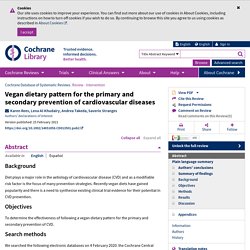
This review assesses the effects of providing dietary advice to follow a vegan diet (excluding all meat, fish, eggs, dairy and honey) or providing foods relevant to the diet (or both) to healthy adults, to people at increased risk of cardiovascular disease and to those with cardiovascular disease, in order to prevent new or recurrent cardiovascular disease, and to reduce the risk factors associated with it. Study characteristics We searched key databases of medical studies up to February 2020 and found 13 randomised controlled trials (RCTs) (in 38 papers) that met our criteria. 1. Key results None of the trials reported on the occurrence of cardiovascular disease either in those with or without disease to begin with. Certainty of the evidence Most studies had limitations in study design, so the evidence should be interpreted cautiously. Conclusions. Vegetarian and vegan diets and risks of total and site-specific fractures: results from the prospective EPIC-Oxford study.
Meet the Meat Alternatives: The Value of Alternative Protein Sources. 1.Ismail I, Hwang Y-H, Joo S-T.
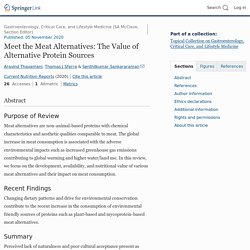
Meat analog as future food: a review. J Anim Sci Technol. 2020;62(2):111–20.Article Google Scholar 2.Wild F, Czerny M, Janssen AM, Kole AP, Zunabovic M, Domig KJ. The evolution of a plant-based alternative to meat. From niche markets to widely accepted meat alternatives. Agro Food Industry Hi-Tech. 2014;25(1):45–9. The public health rationale for promoting plant protein as an important part of a sustainable and healthy diet - Lonnie - 2020 - Nutrition Bulletin. Introduction It is projected that between 2010 and 2050, the world demand for food will double alongside the growing population (from 7 billion to a projected 9.8 billion) and, consequently, the demand for animal‐based foods will increase by nearly 70%, particularly from ruminant meat (from cattle, sheep and goats) (World Bank 2008; WRI 2018).
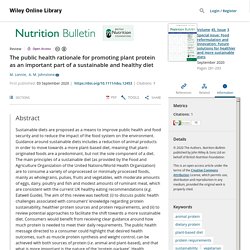
Closing this food gap will intensify the pressure on land (crop and pasture yields) and contribute to an increase in greenhouse gas (GHG) emissions (Henchion et al. 2017). It has been estimated that to meet the growing demand, an additional 600 million hectares of agricultural land will be required, with the annual GHG (CO2 equivalent) emissions reaching 11.25 gigatons (Gt) in 2050 (WRI 2018). This is a significant environmental challenge because, to sustain global warming below a 1.5ºC increase, the annual GHG emissions from agricultural production should not exceed a target of 4 Gt a year (WRI 2018).
Acknowledgements. Plant protein ingredients with food functionality potential - Loveday - 2020 - Nutrition Bulletin. Introduction Many of our foods are assembled or created from purified or partially purified ingredients, and these ‘formulated foods’ include baked goods, dairy foods, beverages, ready meals and more.
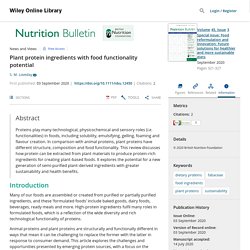
High‐protein ingredients fulfil many roles in formulated foods, which is a reflection of the wide diversity and rich technological functionality of proteins. Animal proteins and plant proteins are structurally and functionally different in ways that mean it can be challenging to replace the former with the latter in response to consumer demand. This article explores the challenges and opportunities presented by emerging protein sources, with a focus on the development of plant‐derived protein ingredients and their use in formulated foods. Vegans, Vegetarians, and Omnivores: How Does Dietary Choice Influence Iodine Intake? A Systematic Review.
Vegan and vegetarian diets are becoming increasingly popular.
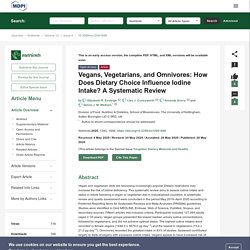
Dietary restrictions may increase the risk of iodine deficiency. This systematic review aims to assess iodine intake and status in adults following a vegan or vegetarian diet in industrialised countries. A systematic review and quality assessment were conducted in the period May 2019–April 2020 according to Preferred Reporting Items for Systematic Reviews and Meta-Analyses (PRISMA) guidelines. Studies were identified in Ovid MEDLINE, Embase, Web of Science, PubMed, Scopus, and secondary sources. Fifteen articles met inclusion criteria. This is an open access article distributed under the Creative Commons Attribution License which permits unrestricted use, distribution, and reproduction in any medium, provided the original work is properly cited. Is a vegan diet detrimental to endurance and muscle strength?
Background/objectives In the general population, there is a popular belief that a vegan diet may be associated with a lower exercise performance due to the lack of certain nutrients in vegan individuals.
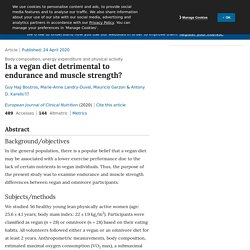
Thus, the purpose of the present study was to examine endurance and muscle strength differences between vegan and omnivore participants. Subjects/methods We studied 56 healthy young lean physically active women (age: 25.6 ± 4.1 years; body mass index: 22 ± 1.9 kg/m2). Participants were classified as vegan (n = 28) or omnivore (n = 28) based on their eating habits. Results. Vegan or vegetarian diet and breast milk composition – a systematic review: Critical Reviews in Food Science and Nutrition: Vol 0, No 0. Veganism, aging and longevity: new insight into old concepts : Current Opinion in Clinical Nutrition & Metabolic Care.
Health outcomes associated with vegetarian diets: An umbrella review of systematic reviews and meta-analyses. Food processing for the improvement of plant proteins digestibility: Critical Reviews in Food Science and Nutrition: Vol 0, No 0. Proteins are essential macronutrients for the human diet.
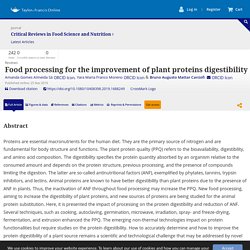
They are the primary source of nitrogen and are fundamental for body structure and functions. The plant protein quality (PPQ) refers to the bioavailability, digestibility, and amino acid composition. The digestibility specifies the protein quantity absorbed by an organism relative to the consumed amount and depends on the protein structure, previous processing, and the presence of compounds limiting the digestion. The latter are so-called antinutritional factors (ANF), exemplified by phytates, tannins, trypsin inhibitors, and lectins. Animal proteins are known to have better digestibility than plant proteins due to the presence of ANF in plants. Nutrition Interventions in Rheumatoid Arthritis: The Potential Use of Plant-Based Diets. A Review.
Introduction Rheumatoid arthritis (RA), a chronic inflammatory autoimmune disease, affects roughly 1% of the world's population (1).
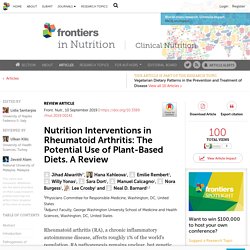
Uric Acid and Plant-Based Nutrition. 1.
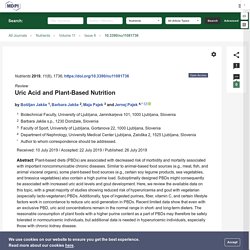
Introduction Plant-based diets (PBDs) are associated with a decreased risk for morbidity and mortality due to most chronic noncommunicable diseases, including cardiovascular diseases, certain types of cancer, metabolic syndrome, type 2 diabetes and obesity [1,2,3,4,5,6,7]. Vegetarian Diet Patterns and Chronic Disease Risk: What We K... : Nutrition Today. Most people in the United States are omnivores who consume meats and other animal products.
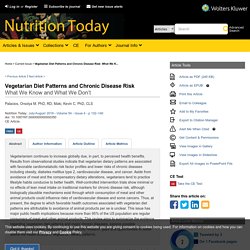
Surveys and polls have shown prevalence of 1.4% to 3.3% for vegetarian diets in the United States, including a prevalence of veganism of approximately 0.5%.1 People choose vegetarian dietary patterns for a variety of reasons. In the National Health Interview Survey in the United States (2012), approximately 2% of the population reported having followed a vegetarian diet pattern within the last 12 months for health reasons, and lifetime history of doing so was 4%.2 Other reasons for choosing vegetarian diets include religious beliefs, as well as concerns regarding animal welfare and the environmental impact of animal food production.3,4 Many who choose a vegetarian dietary pattern have a mix of these motivations.
Mechanisms Potentially Linking Consumption of Meat and Other Animal Products With Health Outcomes Dietary Differences Other Than Meat Consumption. Association Between Plant-Based Dietary Patterns and Risk of Type 2 Diabetes: A Systematic Review and Meta-analysis. Key Points Question What is the role for plant-based dietary patterns in the primary prevention of type 2 diabetes among adults? The Effects of Vegetarian and Vegan Diets on Gut Microbiota. Introduction Recent studies of the human microbiome have emerged as an area of popular interest. For decades, many investigations have elucidated the impact of the human gut microbiota on the physiology of the host, with new and unexpectedly broad implications for health and disease. The human microbiota, defined as the total of all microbial taxa associated with human beings (bacteria, viruses, fungi, protozoa, archaea), consists of a newly estimated 3 × 1013 (trillion) microbes harbored by each person (1).
The term microbiome is often incorrectly used interchangeably with the term microbiota. However, microbiome refers to the catalog of these microbes and their genes. Plant-Based Diets for Cardiovascular Safety and Performance in Endurance Sports. Plant-Based Diets: Considerations for Environmental Impact, Protein Quality, and Exercise Performance. 2. VegPlate: A Mediterranean-Based Food Guide for Italian Adult, Pregnant, and Lactating Vegetarians - Journal of the Academy of Nutrition and Dietetics. Position paper on vegetarian diets from the working group of the Italian Society of Human Nutrition - Nutrition, Metabolism and Cardiovascular Diseases. Vegan diets: practical advice for athletes and exercisers. Plant-based nutrition for healthcare professionals: implementing diet as a primary modality in the prevention and treatment of chronic disease.
תקציר סויה השפעות בריאותיות נייר עמדה. סויה השפעות בריאותיות נייר עמדה. Position of the Academy of Nutrition and Dietetics: Vegetarian Diets. נייר עמדה למטפלים בנושא צמחונות וטבעונות בקרב מתבגרים ומבוגרים.